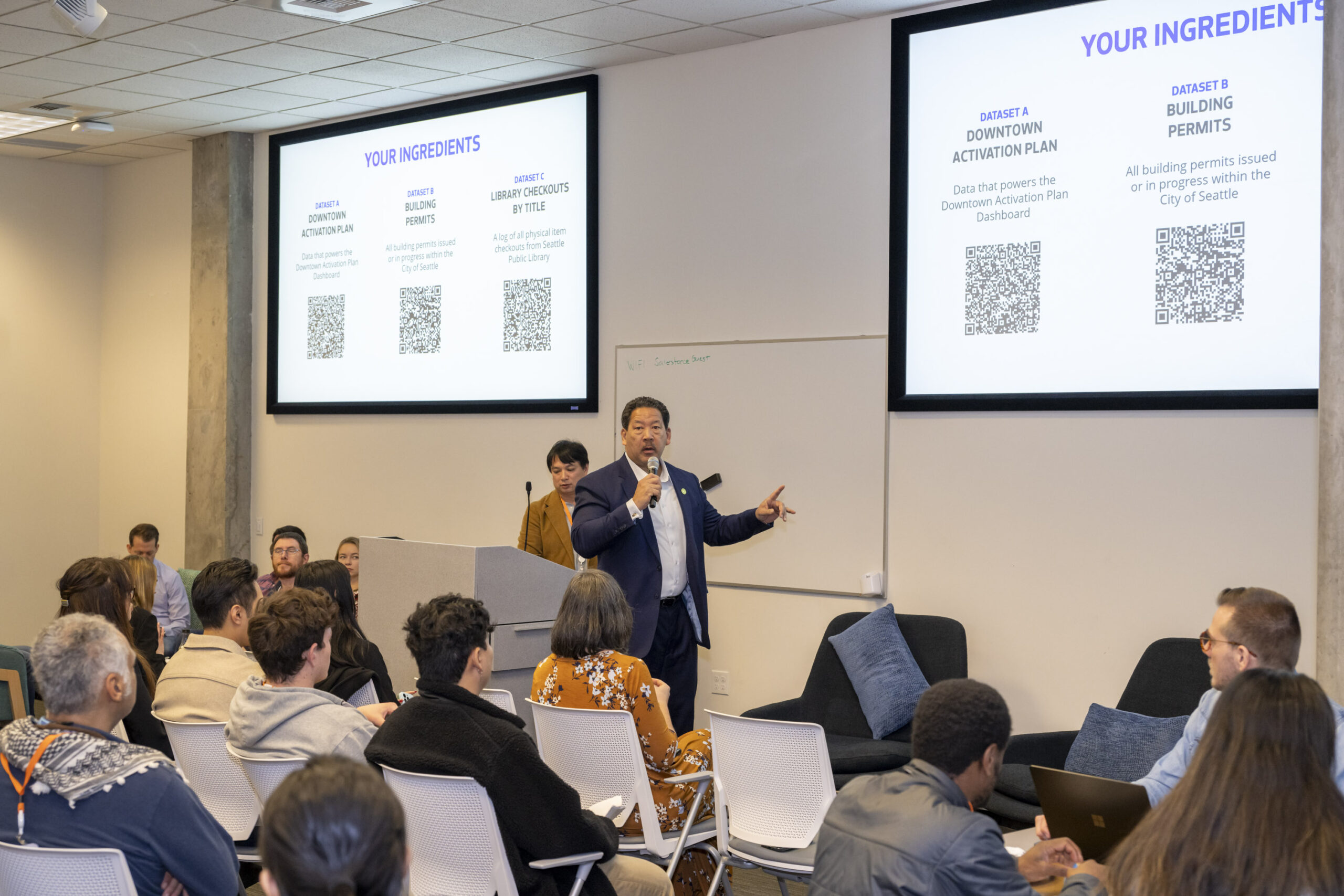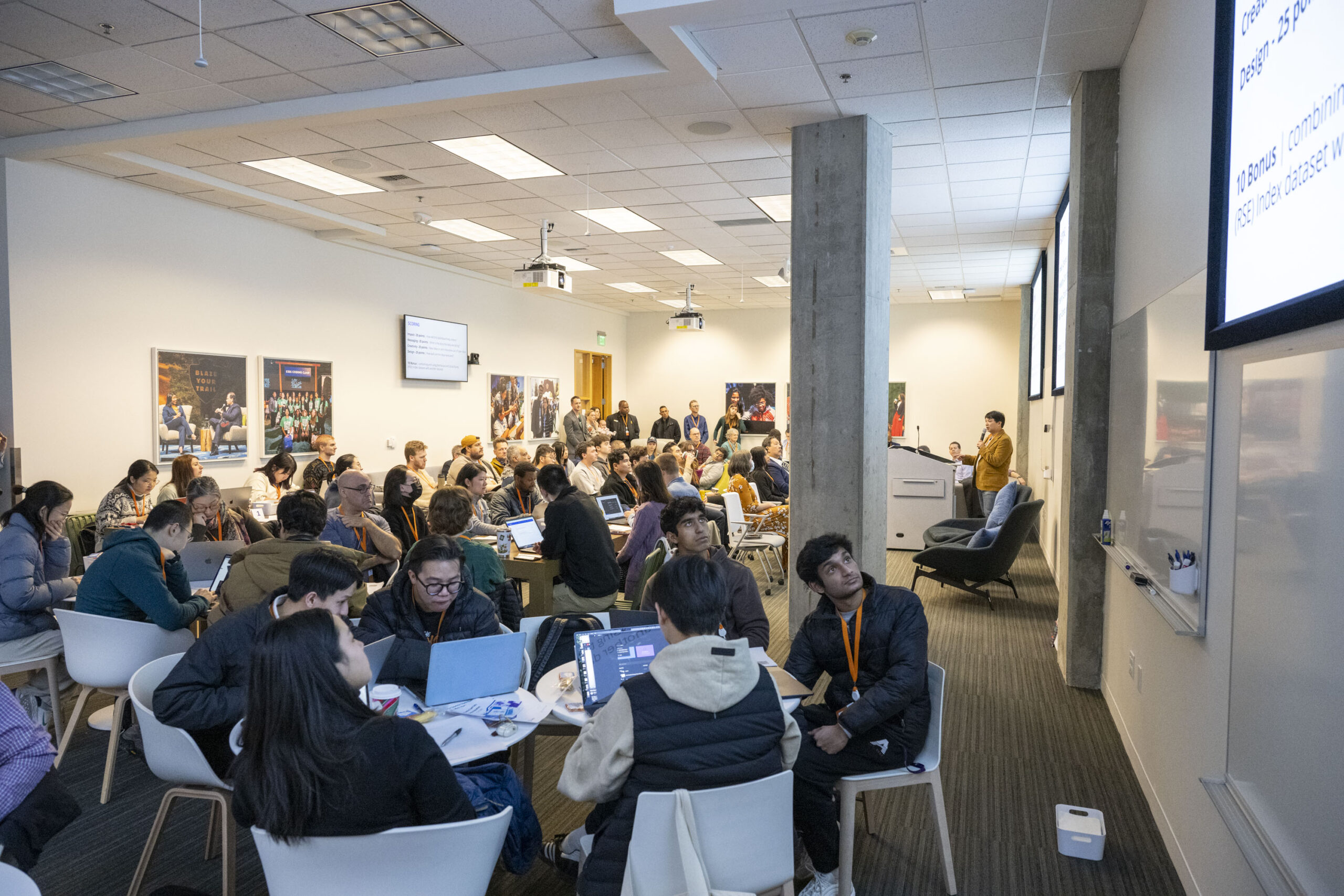
Seattle – Today, Mayor Bruce Harrell shared the City of Seattle’s first comprehensive One Seattle Data Strategy, designed to optimize the City’s use of data to make better decisions, enhance collaboration, protect privacy, standardize best practices, and address the complex challenges faced by our city. Direction for the strategy is outlined in a new Executive Order issued by the mayor today at the City’s first-ever Open Data Hackathon competition. The winner of the Open Data Hackathon was “Team Bun Bun,” including team members from the University of Washington and Seattle Public Libraries, with a visualization that mapped building permit data onto the Race and Social Equity Index Map.
The Hackathon, Executive Order, and Data Strategy build on Seattle’s strong foundation as a national leader in the use of data, with a focus on connecting currently siloed efforts, scaling up prior successes, and empowering community to use public data.
“Data has the potential to transform everything we do as a City, from how we deploy public safety resources to how we build critical infrastructure. Our One Seattle Data Strategy will help turn that potential into progress as we strive to serve our community effectively, efficiently, and equitably,” said Mayor Harrell. “This strategy doubles down on the areas Seattle is already doing well, identifies new opportunities for collaboration, and commits us to a plan for continuous improvement. Thanks to the hard work of many City employees, we are on track to be one of the most well-managed, data-driven local governments in the nation.”
The One Seattle Data Strategy is a three-year plan and would be the City’s first comprehensive and cohesive effort to address how we collect, store, use, and share data internally and externally. The strategy identifies four key pillars to address:
1. Data quality and governance: Strengthening data management and quality standards by establishing unified standards and processes for data management across City agencies.
2. Data literacy and culture: Empowering City staff to lead and innovate with data by establishing data leadership at all levels of the organization, upskilling staff, and creating opportunities for City employees to use data to inform decisions.
3. Data use and equity: Leveraging resources and knowledge for increased collaboration, equity analysis, and consumption of data that will lead to data-informed outcomes, improved transparency, governance, and citizen engagement.
4. Data and community engagement: In addition to advancing our Open Data practices, we will launch work to drive better data transparency, communication, and connection with community members.
“Data is one of the most critical assets public sector leaders have — and the Bloomberg Philanthropies City Data Alliance is aimed at helping cities maximize that asset for public good,” said James Anderson, who leads the Government Innovation program at Bloomberg Philanthropies. “We applaud Seattle for their work to advance and codify a citywide data strategy—engaging community members through the process—which will enhance their ability to effectively problem solve across city hall and sectors, and target interventions that deliver on resident needs.”
The Data Strategy and Executive Order are part of Seattle’s participation in the Bloomberg Philanthropies City Data Alliance, which works with cities across the Americas to bolster their use of data to strengthen government operations, innovate public services, and produce better outcomes for residents. Seattle was selected to participate in the City Data Alliance due to its strong track record of using data to inform decisions and improve services. Seattle’s participation in the City Data Alliance builds on its work through the Bloomberg Philanthropies What Works Cities Certification, which sets a standard of excellence for data-informed, well-managed local government, and recognized the City with Gold Certification.
An interdepartmental City effort led by the Innovation and Performance (IP) team has been working with the Bloomberg Philanthropies City Data Alliance throughout 2023 to develop a plan for each pillar. The plans include a mix of short-term priorities – like a new internal data collaboration portal – with longer-term efforts like updating Seattle’s open data policy. The draft Data Strategy identifies projects, policies, and processes to be developed, iterated, and evaluated from 2024-2026. Timelines vary by project, but the general approach is to draft, socialize, and test ideas in 2024, iterate and improve those ideas in 2025, and formalize and fully implement them in 2026.
“Bloomberg Philanthropies’ City Data Alliance has been a catalyst for advancing our approach to data in Seattle and will help us to improve services, programs, and operations for our community. The One Seattle Data Strategy and Executive Order are a major step forward on our journey to create a more data-centered culture, and we are just getting started,” said Seattle Innovation and Performance Acting Director Madeliene Hernandez. “The One Seattle Data Strategy will help the City deepen our data use practices by looking across datasets rather than working in siloes, and focus our priorities and decision making based on data insights.”
The Mayor’s Executive Order has four key components to advance the Data Strategy:
1. Direct all departments to join the One Seattle Data Strategy
2. Direct all departments to develop an implementation plan to improve the use, governance, staffing, communication, and accuracy of data
3. Launch a new interdepartmental team to develop shared standards for demographic data
4. Establish a new internal governance board to align policies and standards across the City
The City of Seattle hosted a mini-hackathon competition on December 14th to engage data scientists, students, and interested community members with the City’s Open Data portal as part of the new One Seattle Data Strategy. The event was held at Tableau’s Fremont headquarters, hosted by Salesforce, and challenged participants to build a new dashboard or visualization using currently available open data to tell a compelling story about City programs or services.
“Harnessing the power of data can address many economic challenges, including creating new jobs, enabling innovation, and enhancing government services,” said Zach Carstensen, Salesforce Sr. Manager, US and Canada Government Affairs. “Salesforce applauds the One Seattle Data Strategy and the City’s leadership in building a strong data culture.”
The friendly competition was judged based on which dashboard or visualization best embodied the One Seattle Data Strategy, with judging criteria to include impact, messaging, creativity, and design, with bonus points awarded for connecting their data set and analysis with the City’s Racial and Social Equity Index. Hackathon participants included teams from the Puget Sound Regional Council (PSRC), Qualtrics, the University of Washington, Northeastern University, and other community members.
